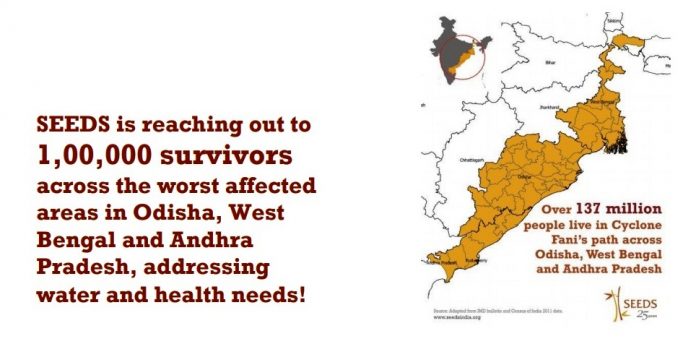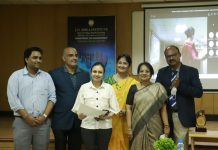‘Cyclone Fani’, one of the strongest storms to batter the Indian subcontinent in decades, made landfall near Puri, on 3rd May 2019, lashing the coast with winds gusting at more than 200 km per hour. Over 10,000 villages and 50 towns bore its brunt, with over 1.4 million people still in relief centres across the states of Andhra Pradesh, Odisha and West Bengal.
Immediate Relief Assistance
Odisha was hardest hit, and SEEDS is reaching out with immediate water, health and hygiene support to the worst affected – largely slum dwellers and rural marginal families. Drinking water is evident as the most urgent need. Taps are dry, local water bodies are broken or contaminated with saline water or garbage, and toilets are waterlogged and not functional. With electricity supply expected to stay affected for at least a week more, pumping stations are out of order and water supply will remain an area of concern. Contaminated drinking water is usually the cause of water borne disease outbreaks in such situations, and thus an urgent focus is being placed on clean drinking water supply, enabling hygienic conditions, and providing medical support via health camps to nip any diseases in the bud.
Early Recovery Assistance
- Transitional Shelter
- Shelter advisories and repair
- Public infrastructure and environment
Keeping an eye on the next level of needs, we will be working with affected families to start reconstruction as soon as possible. With estimates of tens of thousands of houses damaged, there is a strong urgency in getting roofs over people’s heads in the sweltering heat of the coming days, and the monsoon rains and main cyclone season that lies ahead. While plastic sheets and tarpaulin are being distributed in these areas, families cannot survive in these for long, and permanent housing reconstruction will take years. For partially damaged houses, families will be advised to repair them safely, to withstand future disasters.
Damaged schools will need to be rebuilt or repaired soon enough for children to restart their education at the end of the summer. Other public infrastructure like health centres and community buildings will also require attention. While government support will be adequate to do this, SEEDS strives to work with affected communities to fill the time gap till these facilities are accounted for, funded and rebuilt. We call this approach ‘transitional’, wherein transitional houses and schools help affected families survive the coming months better and are the starting point for recovery.
As a part of its immediate relief assistance , SEEDS is responding to Cyclone Fani with the following support:
- Safe drinking water – Taps are dry, and most local water sources are contaminated.
- Hygiene kits and sanitation – Inundation and garbage pose the threat of spread of diseases. Toilets are not functioning.
- Multi-speciality temporary health camps – Those needing medical attention are in larger number than normal, and services are restricted.
Rebuilding using fallen trees: Linking reconstruction with environment – A very large number of trees have fallen across the affected areas. Timber from fallen trees and rubble from damaged houses can be creatively used for reconstruction. This is a unique approach SEEDS is taking to ensure speedy reconstruction with minimum environmental impact. At the same time, plantation drives will be taken up to restore the green cover with local species.
Support SEEDS
Donations for this cause can be made at: https://www.seedsindia.org/cyclonefani/
In addition, we also urge individuals and organisations with technical skills in the water, sanitation, health and shelter construction domains to volunteer with us and lend a helping hand to our countrymen in need. https://www.seedsindia.org/volunteer/
About SEEDS: SEEDS (Sustainable Environment and Ecological Development Society) is a not-for-profit organisation that enables community resilience through practical solutions in the areas of disaster readiness, response and rehabilitation.
Since 1994, the organization has worked extensively on every major disaster in the Indian subcontinent – grafting innovative technology on to traditional wisdom. It has reached out to families affected by disasters and climate stresses; strengthened and rebuilt schools and homes; and has invariably put its faith in skill building, planning and communications to foster long-term resilience. SEEDS is also India’s first agency to be certified for the global Core Humanitarian Standards – an international certification system for quality and accountability in humanitarian response.
SEEDS completed 25 years of outstanding service to humanity in 2019 and is re-anchoring its approach to building resilience through innovation. It continues to empower the most vulnerable across Asia to build a better future.
For more information, visit www.seedsindia.org




















